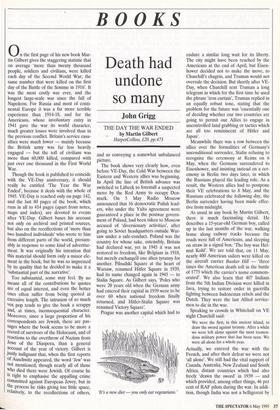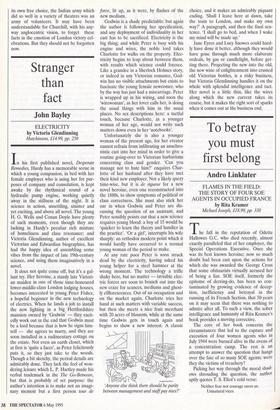BOOKS
Death had undone so many
John Grigg
THE DAY THE WAR ENDED by Martin Gilbert HaglerCollins, £20, pp.473 On the first page of his new book Mar- tin Gilbert gives the staggering statistic that on average 'more than twenty thousand people, soldiers and civilians, were killed each day of the Second World War; the same number that were killed on the first day of the Battle of the Somme in 1916'. It was the most costly war ever, and the longest large-scale war since the fall of Napoleon. For Russia and most of conti- nental Europe it was a far more terrible experience than 1914-18, and for the Americans, whose involuntary entry in 1941 gave the war its world character, much greater losses were involved than in the previous conflict. Britain's service casu- alties were much lower — mainly because the British army was far less heavily engaged — but the toll of civilians was more than 60,000 killed, compared with just over one thousand in the First World War.
Though the book is published to coincide with the VE-Day anniversary, it should really be entitled 'The Year the War Ended', because it deals with the whole of 1945. VE-Day is reached only on page 142, and the last 80 pages of the book, which runs in all to 414 pages (apart from notes, maps and index), are devoted to events after VE-Day. Gilbert bases his account not only on archival and printed sources, but also on the recollections of `more than two hundred individuals' who wrote to him from different parts of the world, presum- ably in response to some kind of advertise- ment. It was originally his intention that this material should form only a minor ele- ment in the book, but he was so impressed by its quality that he decided to make it a `substantial part of the narrative'.
Too substantial, some may feel. By no means all of the contributions he quotes are of equal interest, and even the better ones often suffer from being quoted at excessive length. The intrusion of so much vox pop tends to give the book a scrappy and, at times, inconsequential character. Moreover, since a large proportion of his correspondents are Jewish, there are pas- sages where the book seems to be more a record of survivors of the Holocaust, and of reactions to the overthrow of Nazism from Jews of the Diaspora, than a general account of the year of victory. Gilbert is justly indignant that, when the first reports of Auschwitz appeared, the word `Jew' was not mentioned, though nearly all of those Who died there were Jewish. Of course he Is right to emphasise the appalling crime committed against European Jewry, but in the process he risks giving too little space, relatively, to the recollections of others, and so conveying a somewhat unbalanced picture.
The book shows very clearly how, even before VE-Day, the Cold War between the Eastern and Western allies was beginning. In April the line of British advance was switched to Lubeck to forestall a suspected move by the Red Army to occupy Den- mark. On 5 May Radio Moscow announced that 16 democratic Polish lead- ers, who under the Yalta agreement were guaranteed a place in the postwar govern- ment of Poland, had been taken to Moscow accused of 'diversionary activities', after going to Soviet headquarters outside War- saw under a safe-conduct. Poland was the country for whose sake, ostensibly, Britain had declared war, yet in 1945 it was not restored to freedom, like Belgium in 1918, but merely exchanged one alien tyranny for another. Pilsudski Square at the heart of . Warsaw, renamed Hitler Square in 1939, had its name changed again in 1945 — to Stalin Square. As Gilbert says, `Poles who were 20 years old when the German army had entered their capital in 1939 were to be over 60 when national freedom finally returned, and Hitler-Stalin Square was renamed Victory Square'.
Prague was another capital which had to `It's a new diet — you only eat vegetarians.' endure a similar long wait for its liberty. The city might have been reached by the Americans at the end of April, but Eisen- hower decided not to make the move, to Churchill's chagrin, and Truman would not overrule the decision. But shortly after VE- Day, when Churchill sent Truman a long telegram in which for the first time he used the phrase 'iron curtain', Truman replied in an equally robust tone, stating that the problem for the future was `essentially one of deciding whether our two countries are going to permit our Allies to engage in uncontrolled land grabbing or tactics which are all too reminiscent of Hitler and Japan'.
Meanwhile there was a row between the allies over the formalities of Germany's unconditional surrender, Stalin refusing to recognise the ceremony at Reims on 6 May, when the Germans surrendered to Eisenhower, and insisting instead on a cer- emony in Berlin two days later, in which the Russians played the leading role. As a result, the Western allies had to postpone their VE celebrations to 8 May, and the Russians celebrated the following day, the Berlin surrender having been made effec- tive from midnight.
As usual in any book by Martin Gilbert, there is much fascinating detail. He describes a 15-year-old German boy, called up in the last months of the war, walking home along railway tracks because the roads were full of Americans, and sleeping on straw in a signal box. 'The boy was Hel- mut Kohl'. We are told that, on 11 May, nearly 400 American sailors were killed on the aircraft carrier Bunker Hill — `three times the American death toll in the battle of 1775 which the carrier's name commem- orated'. We also learn that 407 Indians from the 5th Indian Division were killed in Java, trying to restore order in guerrilla fighting between Indonesian rebels and the Dutch. They were the last Allied service- men to die in the war.
Speaking to crowds in Whitehall on VE night Churchill said:
We were the first, in this ancient island, to draw the sword against tyranny. After a while we were left alone against the most tremen- dous military power that has been seen. We were all alone for a whole year.
Actually, we entered the war with the French, and after their defeat we were not `all alone'. We still had the vital support of Canada, Australia, New Zealand and South Africa, distant countries which had also freely 'drawn the sword' in 1939 — and which provided, among other things, 46 per cent of RAF pilots during the war. In addi- tion, though India was not a belligerent by its own free choice, the Indian army which did so well in a variety of theatres was an army of volunteers. It may have been understandable for Churchill, with his any- way anglocentric vision, to forget these facts in the emotion of London victory cel- ebrations. But they should not be forgotten now.



































































 Previous page
Previous page